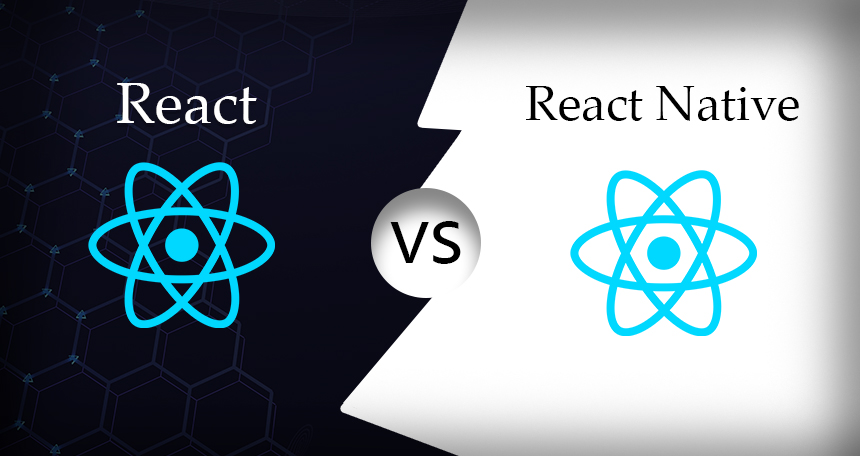
React vs React Native – Which One is Best For You?
If you are new to web development, you might think React and React Native are the same. While both share similarities, there are also huge differences between these two technologies. React is helpful with web development and is largely meant to make web apps and progressive web applications (PWAs).
On the other hand, React Native is a mobile app development framework. So, you can choose one over the other based on whether you are building web apps or mobile apps.
In this blog, I have detailed the React vs. React Native comparison. By the end of it, you will have a viable understanding of both technologies and how they differ from each other.
React vs React Native – Key Differences Between Them
| Features | React | React Native |
| Purpose | React is a JavaScript library designed to build user interfaces for applications. | React Native has been designed to tailor native mobile apps with reusable components. |
| Web or App Development | It is helpful in web development projects. | It proves handy in mobile app development projects for launching apps on Android, iOS and Windows. |
| Utilises | It works by using HTML, CSS, and JavaScript for making user interfaces. | It uses APIs and native UI components to build mobile applications. |
| Rendering | Virtual DOM renders the browser code in React. | Native API render components for mobile applications. |
| Ease of learning | React can be difficult to master for developers. | React Native is renowned for its simplicity and ease of learning. |
When discussing the ReactJS and React Native debate, let us inspect both technologies individually as well.
What is React?
React is a JavaScript library built by Jordan Walke under Facebook. It is completely open-source and is helpful in building user interfaces of websites and single page applications. Currently, Meta maintains React and released its latest version 18.3.1 on 26th of April 2024.
React is handy for building a range of solutions, such as B2B and B2C websites, eCommerce sites, and others. It provides businesses with high rendering performance, enhancing page loading speed.
React Features
- React uses virtual DOM, which allows web pages to render only essential components, enhancing loading performance.
- React.js developers can access reusable components to build web applications.
- High-web page rendering enhances the SEO performance of the web pages.
- React code has high readability, which helps with the maintenance of web applications.
- ReactJs developers can easily integrate third-party plugins, APIs, or libraries with the existing code of the web applications.
- The JavaScript library follows one-way data binding and uses JSX(JavaScript Syntax Extension), which simplifies web development processes.
What is React Native?
React Native is an open-source user interface development framework designed and developed by Meta. It helps to build mobile apps that can run on iOS and Android, Web, and Windows while offering native capabilities to the users. It enables programmers to use the React library to create mobile apps with native functionality.
You can hire developers with experience in React for tailoring high-performance web or mobile apps.
React Native Features
- React Native code directly interacts with the native APIs for rendering components. This helps to provide users with rich native look, feel, and performance in the mobile apps.
- Developers can write a single code base in React Native components for running apps on both iOS and Android platforms.
- Businesses get faster time-to-market ideas and reach a larger chuck of the target audience with React Native.
- You can adopt the principles of agile development cycles with React Native technology.
- It provides the app development team with hot reloading capabilities, which streamlines the app-building process.
React JS and React Native are both suitable technologies for building applications. The differences lie in the features offered and project suitability.
React vs React Native – Detailed Differences
1. Navigation
React.js allows developers to use the React-Router library that lets you navigate on click events. With React Router v5, developers have access to powerful useHistory hook for accessing the history instances.
React Native does not permit use of React Router. It comes with a unique library Navigator for managing smooth transitions between different displays. You can also access React Native Navigation for hassle-free navigation on Android and iOS platforms.
2. Storage
React developers can use local storage for storing and managing data, which means data stored has no expiration date. In contrast, React Native leverages AsyncStorage by default and also a few libraries for locally storing data.
On the iOS platform, AsyncStorage is backed by native code, and on the Android platform, it uses either RocksDB or SQLite, depending on their availability.
3. SEO-friendly applications
SEO or search engine optimization allows businesses with greater visibility on the SERPs. While building applications, React JS developers have access to several tools and libraries to optimize as per SEO guidelines.
React Native, on the other hand, does not offer built-in support for SEO. Developers can make necessary arrangements to create user-friendly React Native apps themselves.
4. Efficiency
React JS can execute client-side code while being rendered on the server side simultaneously. It can easily handle simple and complex tasks, such as designing lower-level elements like clickable buttons or even complex user interfaces like dropdowns.
React Native offers code reusability of up to 80%. This empowers companies with rapid building of software ideas and helps to reach a massive client base.
Wrapping Up
A team working on the front end with a set of programming languages and technologies and then using other technologies to build the back end can double the work. React and React Native are complementary for building high-quality applications.
At Coding Sprint, you can hire developers with hands-on experience in both technologies, which provides greater flexibility in terms of contribution to the project.

